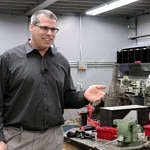At School at Work: How to Make the Most out of Co-op
★★★★
In the final video about Countryside Christian School’s co-op program, we hear from a current student, a former student, the school administrator, and an employer. Their theme: what makes a co-op work well. They discuss the role of pay, the expectations a student should have, and attitudes that can prepare students, employers, and teachers for success.






Leave a Reply